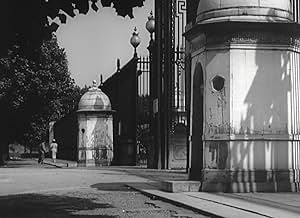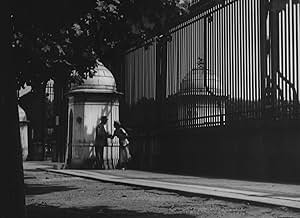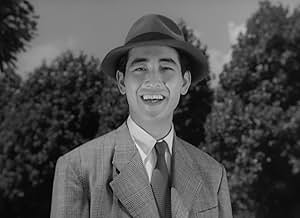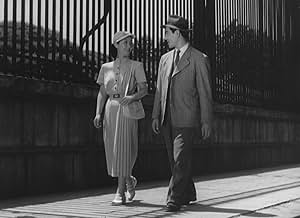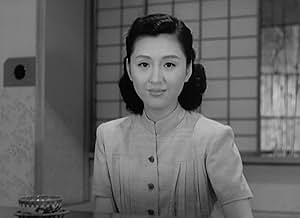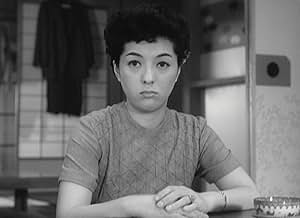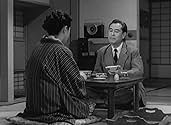ÉVALUATION IMDb
7,6/10
4,1 k
MA NOTE
Un couple d'âge mûr sans enfant affronte une crise conjugale.Un couple d'âge mûr sans enfant affronte une crise conjugale.Un couple d'âge mûr sans enfant affronte une crise conjugale.
- Prix
- 1 victoire au total
Avis en vedette
The Flavour of Green Tea over Rice (Ochazuke no aji) is an Ozu film; a subdued drama analyzing the transformation of Japan post-WWII in small, personal ways. This film follows a childless married couple as they navigate changing traditions, conceptions of marriage, and love. The relationship between the two is strained - the husband is a simple country man who enjoys his country cigarettes, riding in the third class passenger car of trains, and throwing himself into his work with tact and politeness. The wife is a city girl, enjoying spa days, expensive and luxurious decorations, and first class train rides. These two struggle to relate to each other, in a marriage that was set up over a decade ago as an arranged marriage.
The catalyst to this film is when their headstrong niece comes to stay. A product of the new Japan, she is not interested in an arranged marriage, and instead wants to meet someone through dating, and marry for love, not familial status. This is scandalous to both her parents and our married couple. However, the two begin to see each other in a new light, engaging with new ideas, trying new things, and ultimately coming together in a touching and mute scene of culinary exploration and intimacy.
Ozu has a way with scenes. Each scene is meticulously detailed, and dripping with meaning, while maintaining a muted, quite feel. Ozu is, of course, a master of film making of this era, and this film is no different. It poignantly portrays the changing nature of relationships, love and marriage in Japan with subtlety, grace, and beauty. There are many wonderful scenes and shots in this film, and it is an Ozu film worth watching.
Complaints-wise, this film feels much slower then many of Ozu's films, almost to the point of not really moving. This seems to be a stylistic choice that compliments the thesis of the film, but also makes the film a bit distractable at times. Scenes feel like they jump at times, and the chronology of events, while supposed to be clear, is often not, for brief moments.
A wonderful film in many ways that just, barely, lacks the Ozu charm and perfection that is common in films like Tokyo Story, for example. Even so, this is a lovely, sweet and touching film that is easily watchable, and contains many of the charms of Ozu's work. Easy recommendation for fans of Ozu, or fans of quite, small and beautiful stories and dramas.
The catalyst to this film is when their headstrong niece comes to stay. A product of the new Japan, she is not interested in an arranged marriage, and instead wants to meet someone through dating, and marry for love, not familial status. This is scandalous to both her parents and our married couple. However, the two begin to see each other in a new light, engaging with new ideas, trying new things, and ultimately coming together in a touching and mute scene of culinary exploration and intimacy.
Ozu has a way with scenes. Each scene is meticulously detailed, and dripping with meaning, while maintaining a muted, quite feel. Ozu is, of course, a master of film making of this era, and this film is no different. It poignantly portrays the changing nature of relationships, love and marriage in Japan with subtlety, grace, and beauty. There are many wonderful scenes and shots in this film, and it is an Ozu film worth watching.
Complaints-wise, this film feels much slower then many of Ozu's films, almost to the point of not really moving. This seems to be a stylistic choice that compliments the thesis of the film, but also makes the film a bit distractable at times. Scenes feel like they jump at times, and the chronology of events, while supposed to be clear, is often not, for brief moments.
A wonderful film in many ways that just, barely, lacks the Ozu charm and perfection that is common in films like Tokyo Story, for example. Even so, this is a lovely, sweet and touching film that is easily watchable, and contains many of the charms of Ozu's work. Easy recommendation for fans of Ozu, or fans of quite, small and beautiful stories and dramas.
Another sensitive Ozu film about family. In this one, a somewhat upper-class woman resents her more simple, middle-class husband (by arranged marriage), while also encouraging her niece to go to arranged marriage meetings. As always with Ozu, I found an awful lot to like about this movie, but I wasn't quite enamored enough to gush over it. Most of the core cast is superb, although it's not Ozu's usual team (Setsuko Hara is nowhere to be seen, although Chishu Ryu and Chikage Awashima have minor roles). Michiyo Kogure might be a little too nasty, but I have to say it's kind of refreshing to see a less restrained character in an Ozu film. Perhaps the film wraps up too nicely and neatly, going too obviously for a touching moment, but I wouldn't say it's entirely unwarranted. At any rate, I enjoyed the film with its insights and gentle humor.
Ozu marriage stories are one of the best ones. He really hits you with his deep and truthful dialogues. I loved the cinematography and the use of shadows. Also, I got hungry watching this.
Michiyo Kogure is discontented with her long marriage to Shin Shiburi. She refers to him as "Mr. Obtuse" to her female relations and friends, and talks them into going on holiday with her, claiming to him that her niece, Keiko Tsushima, is at the resort, suffering from appendicitis; she's probably scared and lonely; and then Miss Tsushima walks in. Miss Tsushima is also a problem. Like many an Ozu woman, she doesn't want to get married yet, and certainly doesn't want an arranged marriage like her aunt. It's so primitive.
It all comes to a head one evening when he's enjoying rice with green tea and his wife doesn't like that way of eating it. He tries to explain that he likes simple, primitive, informal things, like cheap cigarettes and third-class railway tickets and pachinko machines. He understands she likes the 'better' things, and that's fine. And he won't pour tea on his rice any more. Her response is to walk out of the room.
I decided most of the way through that this was Ozu's variation on THE TAMING OF THE SHREW, without any of Petruchio's cruelty.... at least on the part of Mr. Shiburi. The studied cruelty is exhibited, in truth by Miss Kogure. There's not a cruel bone in Shiburi's body. He tries to get his niece to do the right thing simply by talking. He's remembered fondly by a member of his old army squadron as kind; he's sponsoring Kôji Tsuruta for a job at his company because he's the brother of an old high-school friend who got killed in the war. Perhaps Kate is a combination of Miss Kogure and Miss Tsushima.
The transformation of Ozu's style from before the war is almost complete. Gone are the American movie posters, although there's some discussion of a Jean Marais film; and the camera sticks pretty close to the floor, although there is one pull-in at the end of a scene, after the players have left. I'm not sure what that is supposed to mean.
It all comes to a head one evening when he's enjoying rice with green tea and his wife doesn't like that way of eating it. He tries to explain that he likes simple, primitive, informal things, like cheap cigarettes and third-class railway tickets and pachinko machines. He understands she likes the 'better' things, and that's fine. And he won't pour tea on his rice any more. Her response is to walk out of the room.
I decided most of the way through that this was Ozu's variation on THE TAMING OF THE SHREW, without any of Petruchio's cruelty.... at least on the part of Mr. Shiburi. The studied cruelty is exhibited, in truth by Miss Kogure. There's not a cruel bone in Shiburi's body. He tries to get his niece to do the right thing simply by talking. He's remembered fondly by a member of his old army squadron as kind; he's sponsoring Kôji Tsuruta for a job at his company because he's the brother of an old high-school friend who got killed in the war. Perhaps Kate is a combination of Miss Kogure and Miss Tsushima.
The transformation of Ozu's style from before the war is almost complete. Gone are the American movie posters, although there's some discussion of a Jean Marais film; and the camera sticks pretty close to the floor, although there is one pull-in at the end of a scene, after the players have left. I'm not sure what that is supposed to mean.
Japanese master Yasujiro Ozu made this 1952 film between two masterpieces, Early Summer and (especially) Tokyo Story, and this film suffers a bit by comparison with them. As in other (somewhat more accomplished) movies by Ozu (one thinks especially of the superb Late Spring) the plot deals on the issue of whether a young woman should marry, and if that marriage should be a love marriage or arranged one. There is a middle aged, childless couple, the snobbish, nasty Taeko (Michiyo Kogure) and her husband, the honest, good but a bit dull salary man Satake (Shin Saburi). Her nephew, the pretty young Setsuko (Keiko Tsushima) comes to visit, she has to go to an interview for an arranged marriage, but seeing the loveless marriage between Taeko and Satake, and how she mocks him behind his back, is not very interested.
Ozu's best films haven't dated a bit, but this one has somewhat. Moreover, while I don't agree with the generalization that all of Ozu's films are slow (not all of them are), this one is on the leisurely paced side. What's more, the movie takes some time to develop its plot so it does require a bit of patience from the viewer. You will eventually warm up to this movie, I think, but not immediately.
On the plus side, it is a good, interesting movie, with believable, well developed characters. Chishu Ryu, Chikage Awashima and Kumiko Mikaye (all regular of many Ozu films) have bit roles here.
Ozu's best films haven't dated a bit, but this one has somewhat. Moreover, while I don't agree with the generalization that all of Ozu's films are slow (not all of them are), this one is on the leisurely paced side. What's more, the movie takes some time to develop its plot so it does require a bit of patience from the viewer. You will eventually warm up to this movie, I think, but not immediately.
On the plus side, it is a good, interesting movie, with believable, well developed characters. Chishu Ryu, Chikage Awashima and Kumiko Mikaye (all regular of many Ozu films) have bit roles here.
Le saviez-vous
- AnecdotesAt the start of the film, two characters mention going to see a new film with Jean Marais. The film was most likely Orphée (1950), which was released in Japan in June 1951.
- Citations
Taeko Satake: Think well before you pick your groom, it's important.
- ConnexionsFeatured in David Bordwell on 'The Flavor of Green Tea Over Rice' (2019)
- Bandes originalesLove's Old Sweet Song
Composed by J.L. Molloy (as James Lyman Molloy)
Meilleurs choix
Connectez-vous pour évaluer et surveiller les recommandations personnalisées
- How long is The Flavor of Green Tea Over Rice?Propulsé par Alexa
Détails
- Date de sortie
- Pays d’origine
- Langue
- Aussi connu sous le nom de
- The Flavor of Green Tea Over Rice
- Lieux de tournage
- société de production
- Consultez plus de crédits d'entreprise sur IMDbPro
- Durée1 heure 56 minutes
- Couleur
- Mixage
- Rapport de forme
- 1.37 : 1
Contribuer à cette page
Suggérer une modification ou ajouter du contenu manquant

Lacune principale
By what name was Ochazuke no aji (1952) officially released in India in English?
Répondre
